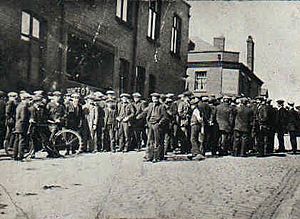Interwar unemployment and poverty in the United Kingdom facts for kids

Between the two World Wars (from 1918 to 1939), many people in Britain struggled to find work. This time is often called the "interwar years." Unemployment was a huge problem. More than 1,000,000 people were usually out of work. In 1933, this number reached over 3,000,000. This meant more than 20% of all working people had no jobs. Some areas, like South Wales and Liverpool, had even higher numbers of jobless people. The government tried to help by expanding unemployment insurance. This was like a payment system for people who lost their jobs.
Contents
Why Did So Many People Lose Their Jobs?
After World War I, many industries faced big problems. Here are some of the main reasons:
End of the War Boom
Right after the war, there was a short period of growth. For example, shipping companies quickly built more ships. They thought there would be a lot of demand. But this growth didn't last long. Soon, there were too many ships and not enough goods to carry. This led to a big slowdown, and many people lost their jobs.
Old Industries Struggled
Britain had many jobs in older industries like coal mining, shipbuilding, and textile factories. These industries were not updated with new technology as much as in other countries. After the war, other countries started making similar goods more cheaply. This made it hard for British businesses to compete. Also, new industries that appeared, like car manufacturing, didn't create as many jobs as the old ones used to.
Losing Overseas Customers
Britain used to sell a lot of its goods to other countries. But after the war, other nations started making their own products. This meant Britain lost many of its customers around the world. This made the problem of too many goods and not enough buyers even worse.
The Great Depression Hits
In 1929, the Wall Street Crash happened in America. This caused a huge economic crisis around the world. It led to something called the Great Depression. Trade between countries slowed down a lot. This made unemployment in Britain even worse.
Life During the Interwar Years
Even though many people faced unemployment, not everyone was struggling. In fact, many parts of Britain were quite well-off. Prices for goods actually went down during this time. Also, the average income for people who had jobs went up by about a third.
New Homes and Goods
The idea of a "property-owning democracy" became popular. This meant more people could own their own homes. About 3,000,000 new houses were built in the 1930s. Land, workers, and building materials were cheap. You could buy a small house for about £225 and a semi-detached house for £450.
Middle-class families started buying many new things. They bought radiograms (which played music), telephones, three-piece suites (sofas and chairs), electric cookers, and vacuum cleaners. They also enjoyed new entertainment. People drove cars like the Austin 7 to Odeon cinemas to watch movies. They also bought popular cigarettes like Craven A. So, even with the economic problems, many new products became available, leading to a "consumer boom" for some.
Protests and Marches
The high unemployment and tough times led to many protests. People wanted the government to do more to help.
The General Strike of 1926
One of the biggest protests was the General Strike in 1926. This was when many different types of workers stopped working at the same time. They were showing support for coal miners. The miners were protesting against wage cuts and longer working hours.
The Jarrow March
Another famous protest was the Jarrow March in October 1936. About 200 unemployed men from the town of Jarrow walked all the way to London. They wanted to show the government how bad unemployment was in their town. They hoped to get help for their community.
There were also other "hunger marches" organized by groups like the National Unemployed Workers Movement. People also protested against "means testing." This was a system where the government checked how much money a person had before giving them unemployment benefits. Many felt it was unfair and made things harder for struggling families.
 | Shirley Ann Jackson |
 | Garett Morgan |
 | J. Ernest Wilkins Jr. |
 | Elijah McCoy |

